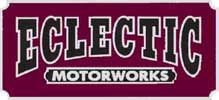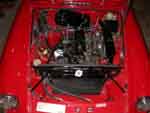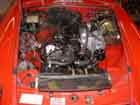
|
Eclectic Motorworks, LLC 445 West 22nd Street Holland, MI 49423 616.355.2850 carlheideman@yahoo.com |
|
|
|
home page |
|
background |
|
services & expertise |
|
events & training |
|
shop tour |
|
|
|
Whether your engine is stock or modified, all performance work must begin with a good tune, preferable followed by session on a chassis dynomometer.
We find that a good tune can easily add 5-10HP at the wheels to a stock engine. For modified engines, the tune can unlock still more power. Our comprehensive tuning procedure checks and/or adjusts the following.
Following this tune, a trip to Baker Engineering for a chassis dyno tune is an optional way to get the last bit of power out of your car as well as measure the actual horsepower, torque, and air/fuel ratio under full load at the wheels at engine RPMS from 2000-redline. |
Why the Performance
Tune is so Important
Over the years, we've had a lot of customers come to us with complaints
about the performance of their cars, usually ready to spend considerable
sums of money on performance upgrades. These complaints usually
center around two areas: Driveability and acceleration performance.
The customers have often felt frustrated that they've made barely
noticable acceleration performance upgrades to their cars while
the overall quality of idle, acceleration smoothness, and steady-state
cruise driveability has diminished. Many of these customers did
not realize it is possible to have good drivability with performance
upgrades. Good drivability is the direct result of a good tune by
someone with the experience and tools to check and adjust engine
parameters, ignition systems, and induction components.
Most of these customers have had rather mild engines. Even so,
once the drivability concerns were addressed, they often were satisfied
with the performance of their car. Others had a good baseline from
which to decide what types of performance upgrades to make.
This is why we strongly suggest a good performance tune and dyno
tune to start your performance upgrades for your car. Making a good
plan from this baseline will yield greater satisfaction and likely
lower cost in the long-run of your performance project.
How much does this cost? The tuneup will usually cost $300-600
depending on the parts and repairs needed. The dyno session, which
includes dyno time at Baker Engineering, travel time, and tuning
by Carl Heideman, is usually around $300-400. If you think this
is expensive, ask us for some customer references--they'll all agree
that this is the best performance value you can find.
|
|
| ©2004 Eclectic Motorworks, LLC. All rights reserved. |
|



